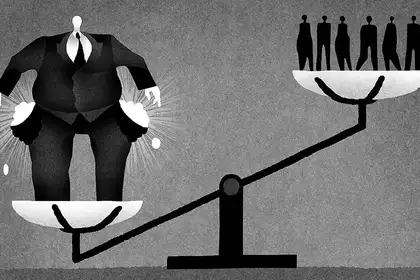
In 2014, the OECD put New Zealand at the top of its list for inequality growth.
By Professor Christoph Schumacher
New Zealanders, congratulations. You are living in the most prosperous country in the world. This is according to the oft-cited Legatum Prosperity Index. This should make you very happy if you live in New Zealand and ecstatic if you are the incumbent Prime Minister in an election year…but before we pat ourselves on our collective backs, let’s scratch the surface a little.
New Zealand has one of the most open economies in the world (in fact we are ranked first on the Legatum Open Economy Index, too), we foster an entrepreneurial business environment (ranked second in the world), emphasise social capital (ranked first in the world) and we are first again for individual freedom and social tolerance. Based on such a glowing report card, if I hadn’t already moved here many years ago I would buy a flight right now.
On face value, we do look superb – not to mention our proud heritage of egalitarianism. Yet, in the recent Stuff.co.nz/Massey Election Survey of almost 40,000 people, only 33 per cent of respondents believe that New Zealand is a country of equal opportunity and 68 per cent believe that inequality in this country is too high and/or growing fast.
Where has this perception come from? Is it a product of our ever-growing social media networks where we see that everybody else has more than we have? Where the privileged are living life to the Max Key?
We have all heard the phrase that the rich are getting richer and the poor poorer. Yet most economic experts suggest that globalisation and free trade increases efficiency and, since the rising tide lifts all boats, even the poor become richer. So where is the problem?

Professor Christoph Schumacher.
We are prosperous, but inequality is growing fast
Well, the rate at which the rich are getting richer is so much faster that the gap between the rich and the poor is increasing by the day – and, by the looks of it, much faster in New Zealand than anywhere else. In 2014, the OECD put New Zealand on top of the list of inequality growth and currently we rank 27 out of 35 countries on the equality of income list.
In numbers this means that the incomes of wealthy New Zealanders have doubled in the two decades since 1985, while the incomes of the poor have stagnated. While the top fifth get 40 per cent of after-tax income in this country, the bottom fifth get just eight per cent.
There are two ways you can look at this. If you believe in a free market economy where everybody is in charge of their own destiny, some people will do better than others and those who work harder or smarter deserve more. Twenty-five per cent of the respondents in the Stuff.co.nz/Massey Election Survey feel this way and indicated that most of the poor are not trying hard enough.
However, the majority of people (58 per cent) believe poverty is real and unjust and we don’t all start on a level playing field. Some people are disadvantaged from birth, simply by not having the opportunities to prosper due to cultural, health, gender, racial, financial or similar constraints.
What can be done?
So, how did New Zealand go from being a country known for its egalitarianism to a country with higher income inequality than most of the developed world? The political changes post-1984 surely played their part. It was at that time that New Zealand really started to embrace the idea of a free market economy and cut its top tax rate in half, reduced social welfare, cut funding for education and prioritised capital over workers.
Given that we have just topped the global prosperity rankings, you might argue that it was the right thing to do. A word of caution. Research shows that a high level of income inequality will reduce economic performance and eventually lead to social unrest. People that are disenfranchised don’t prosper.
As a country we shouldn’t be happy that only a small section of society is enjoying these new heights of prosperity. The solution is not to simply redistribute more from the haves to the have-nots, but to ensure that everybody has a chance to take part in New Zealand’s prosperity creation.
So what could we do? New business models in which all employees participate in profit sharing – and not just top management – would help. Globally, there are several companies that have started to do this and they are doing very well. We could also increase the importance of apprenticeships as a way of offering training and job security. Free education and living wage models are initiatives used around the world with some success.
The measure of a country is not how much wealth it creates, but how well it looks after all its people. So let’s not rest on our successes, but re-invigorate that egalitarian spirit.
Christoph Schumacher is a Professor of Economics and Innovation at the Massey Business School.